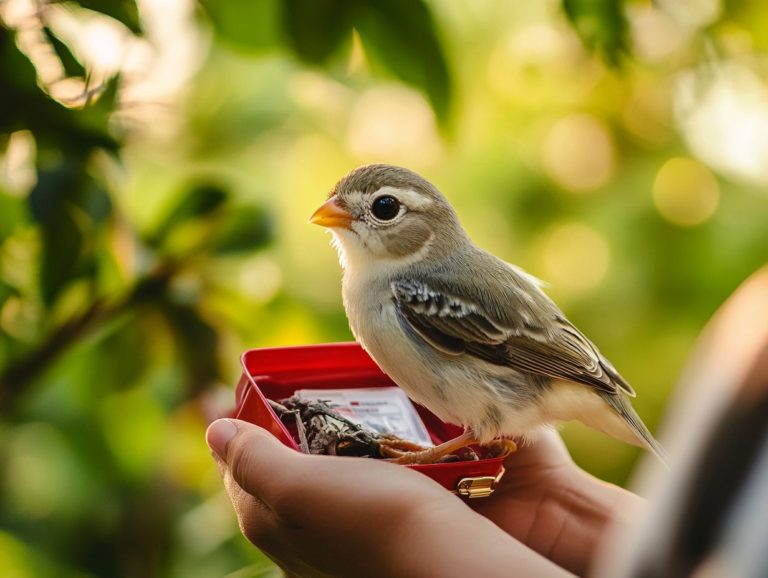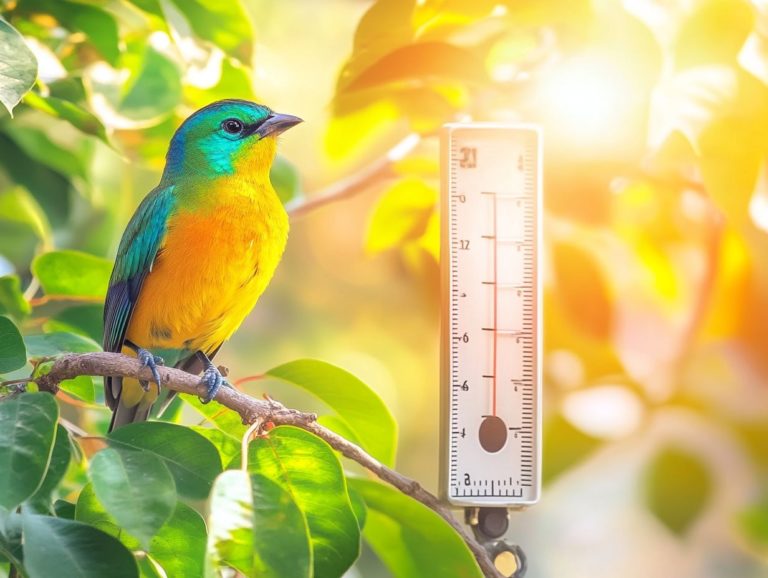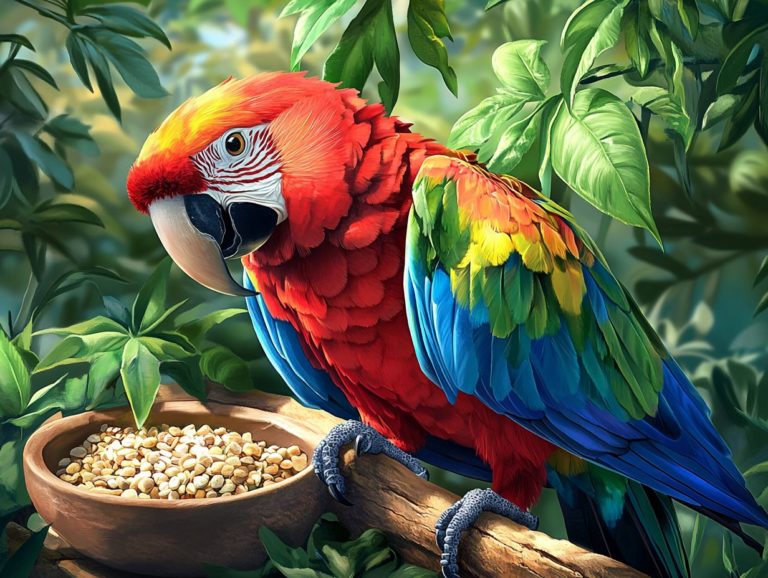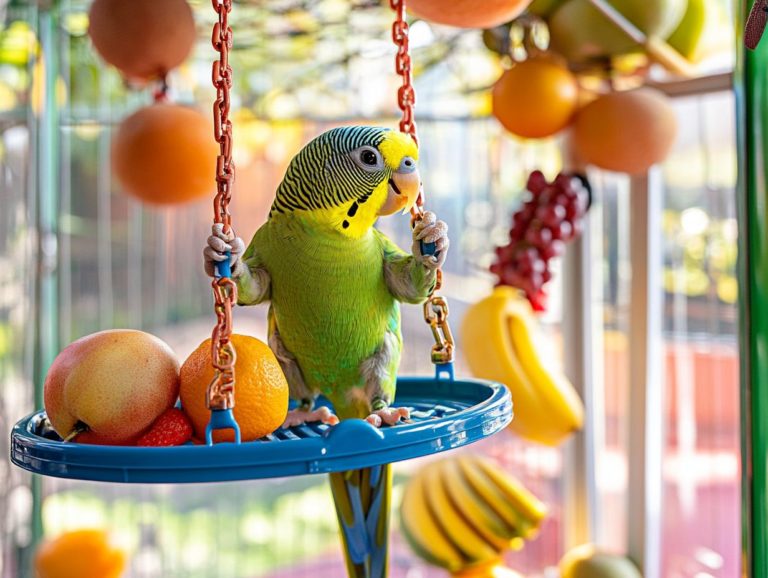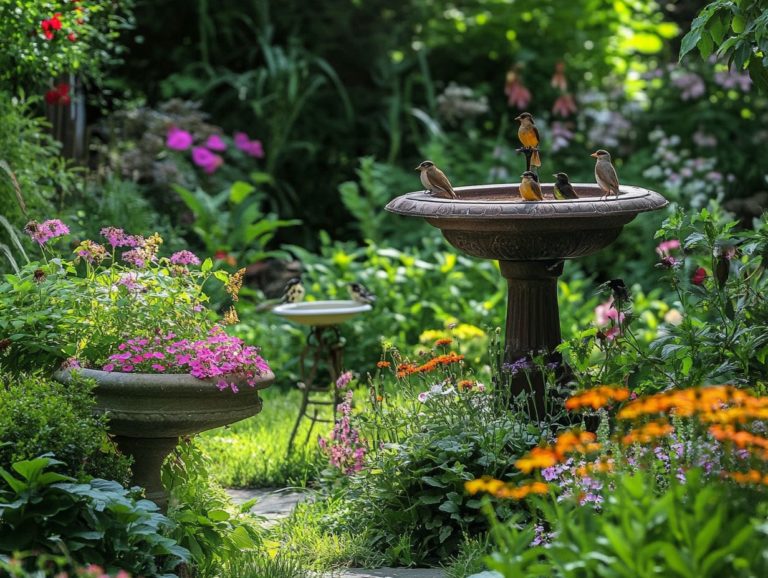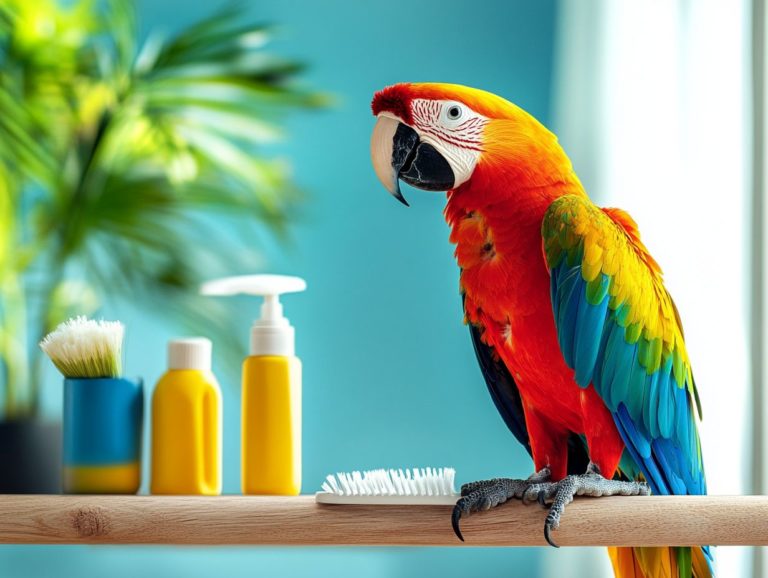Seasonal Health Tips for Your Pet Bird
Seasonal changes can significantly impact the health and well-being of your pet bird. As temperatures fluctuate and daylight hours shift, your feathered companion may face various challenges, such as molting in the spring or dealing with the chill of winter. Keeping your bird hydrated is essential during these transitions.
This article offers tips for preparing your home, recognizing potential health concerns, and providing seasonal care tailored to your bird’s unique needs. You ll find insights on keeping their environment cozy and safe.
With practical guidance for each season, you can ensure your pet birds remain happy and healthy throughout the entire year.
Contents
- Key Takeaways:
- Why Seasonal Changes Impact Pet Birds
- Preparing for Seasonal Changes
- Common Seasonal Health Concerns for Pet Birds
- Specific Tips for Each Season
- Overall Tips for Maintaining Your Pet Bird’s Health
- Frequently Asked Questions
- What are some important seasonal health tips for my pet bird?
- How should I adjust my pet bird’s diet during different seasons?
- What kind of shelter should I provide for my pet bird during extreme weather conditions?
- How often should I clean my pet bird’s cage during different seasons?
- Are there any common illnesses that pet birds are likely to get during certain seasons?
- How can I help my pet bird stay active during colder months?
Key Takeaways:
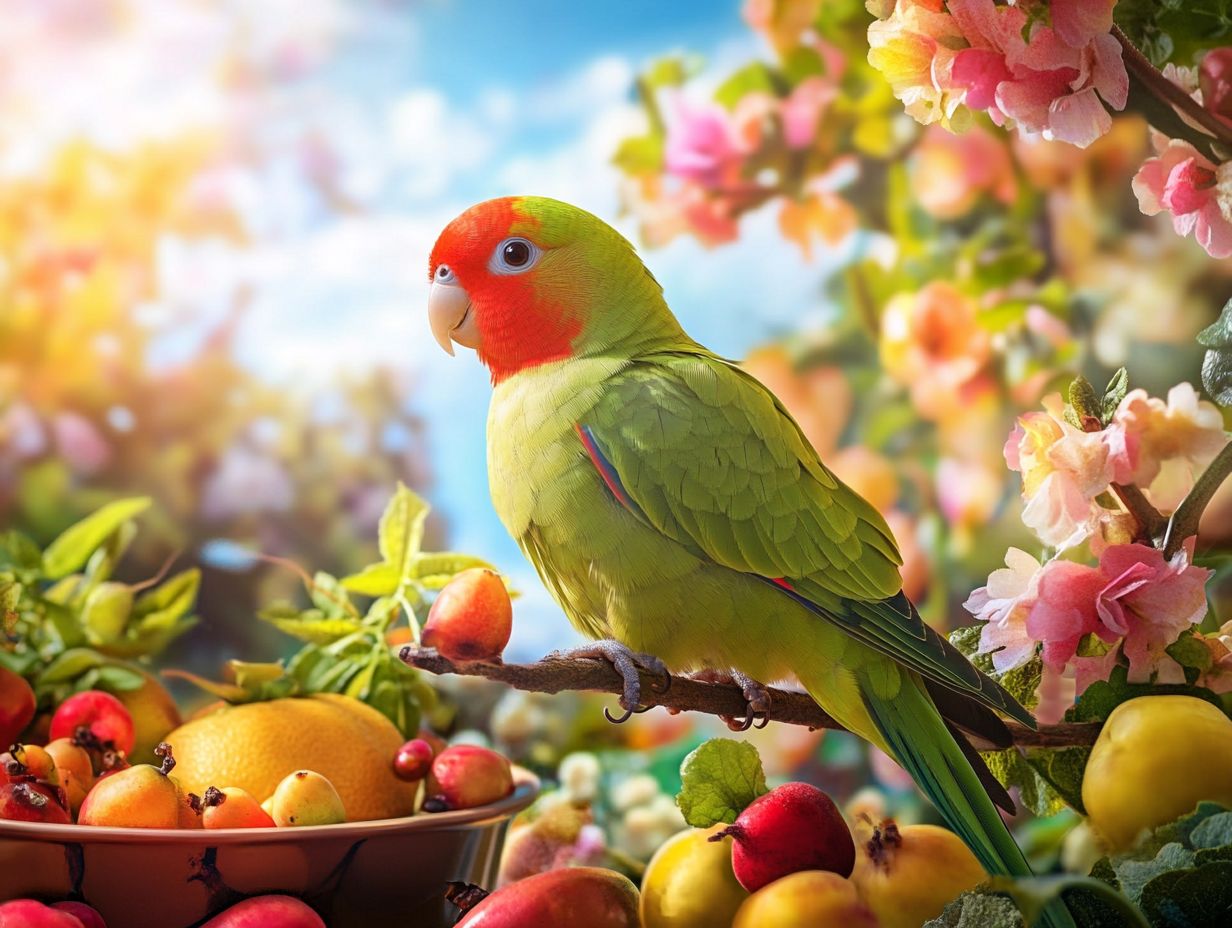
- Keep your pet bird safe and comfortable during seasonal changes by providing a suitable environment, including proper temperature control.
- Be aware of common seasonal health concerns for pet birds and take necessary steps to address them, such as adjusting their diet and ensuring hydration.
- Adjust your care routine for your birds according to the specific tips for each season.
Why Seasonal Changes Impact Pet Birds
Seasonal changes significantly influence the overall health and wellness of pet birds. They can affect your bird’s behavior, immune system, and respiratory function. During winter, it’s crucial to monitor their hydration and nutrition as temperature and humidity fluctuations can affect their well-being. A drop in temperature can lead to discomfort if proper precautions aren t taken, while summer heat brings its own set of challenges.
As a bird owner especially if you have exotic pets like parrots and cockatoos understanding these seasonal impacts is important. By doing so, you can ensure your feathered friends stay cozy and healthy all year round, which is vital for their health.
Preparing for Seasonal Changes
Preparing for seasonal changes is essential for maintaining a safe and comfortable environment for your pet birds. Fluctuations in temperature and humidity can significantly affect their health. Monitoring humidity levels is critical.
This preparation involves fine-tuning their living conditions, such as adjusting their cages and providing cozy perches. Proper nutrition is also necessary to boost their immune system and support their respiratory health.
It’s vital to keep a close eye on the environment. Guard against drafts and extreme temperature drops that could harm their respiratory system and overall comfort. Ensuring they receive adequate vitamin D is also important.
Creating a Safe and Comfortable Environment
Creating a safe and comfortable environment for your pet birds is crucial, especially during seasonal shifts. Managing their hydration levels is also important. Proper temperature control and humidity can enhance their well-being. Ensure they have clean water available at all times.
Keeping their cages free from drafts and providing cozy perches can help them feel secure. Maintaining adequate humidity is essential to prevent respiratory issues. Incorporating houseplants can transform their surroundings into a more inviting habitat.
Birds thrive in spaces that mimic their natural habitats. Striking a balance between warmth and coolness is key to providing a cozy environment. Aim to maintain their living area between 65 F and 75 F, depending on the species. Use a hygrometer to monitor moisture levels ideally between 40% and 60% to help prevent respiratory issues.
Steering clear of sudden temperature fluctuations will help your feathered friends remain comfortable, especially in winter when they may feel anxious. Positioning the cage away from air-conditioning vents or heaters minimizes drafts, creating a stable environment where they can safely explore and play, which is important for their behavior.
Common Seasonal Health Concerns for Pet Birds
Understanding common seasonal health concerns for pet birds is essential for ensuring their well-being. This includes paying special attention to hydration and nutrition. Fluctuations in temperature and humidity can trigger various health issues, including dehydration and respiratory complications.
For instance, in the winter months, the dry air may lead to dehydration and respiratory complications. In contrast, the summer heat can pose a risk of overheating, particularly for exotic species like African greys and cockatoos. It’s important to provide them with extra protein in their diet during these times.
Being attuned to the signs your birds display is crucial for timely intervention. Observing changes in their behavior and energy levels helps maintain their health and vitality.
Identifying and Addressing Potential Issues
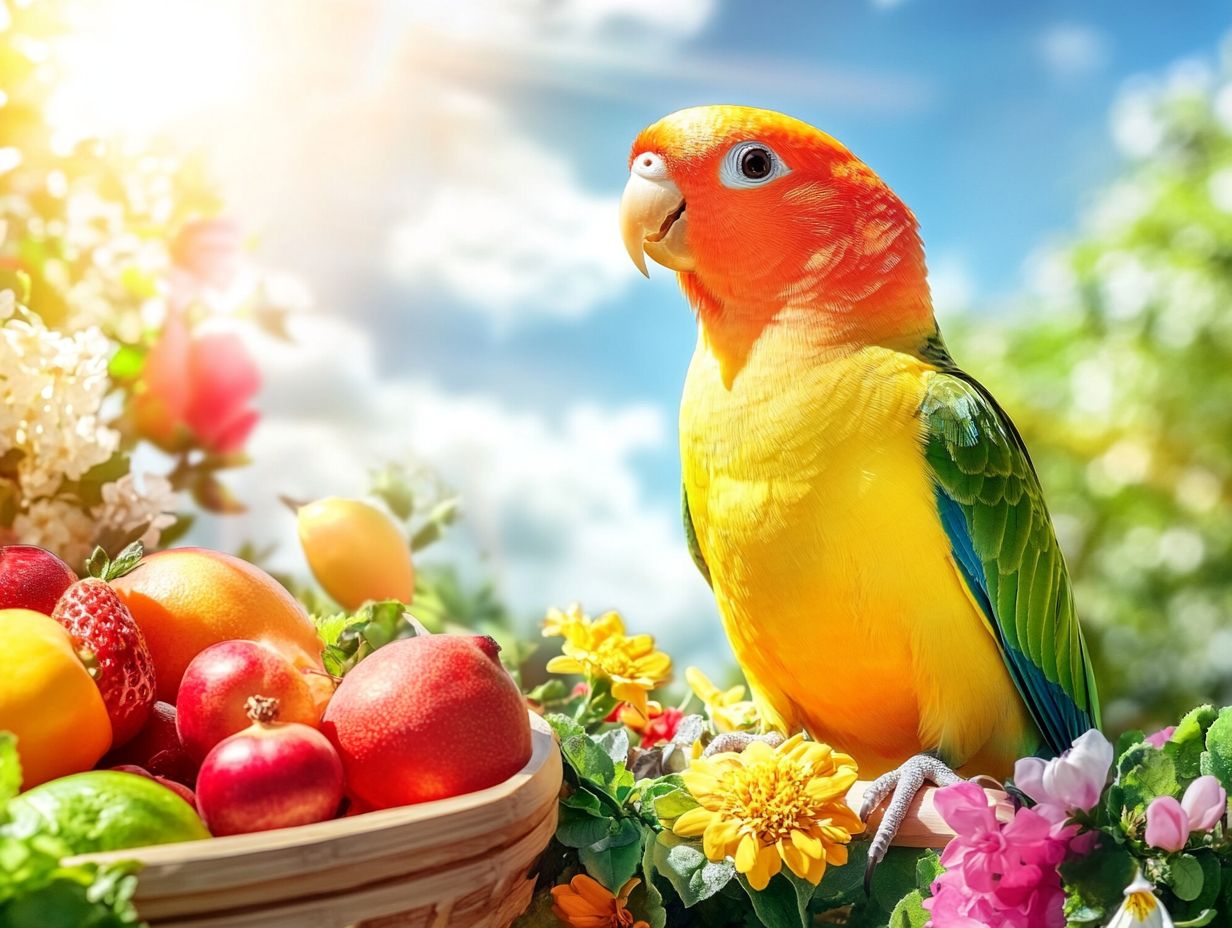
Identifying and addressing potential health issues in your pet birds is crucial for ensuring their long-term wellness. Subtle signs can indicate serious underlying problems, especially concerning their respiratory health. Regularly observing their behavior, feather condition, and energy levels can offer valuable insights into their health status and help signal when to take action.
Providing proper nutrition, hydration, and a comfortable environment can help mitigate many seasonal concerns, including dehydration and respiratory complications. For example, monitoring their respiratory system during drastic temperature drops can prevent conditions like Aspergillosis a fungal infection that can be serious if not caught early and Chlamydia psittaci.
Stay vigilant for changes in vocalization and appetite. Act quickly at the first sign of changes in behavior to keep your birds thriving! Make sure your birds enjoy a balanced diet rich in essential vitamins and minerals, including protein from sources like Brazil nuts and walnuts. Ensure fresh water is always available for optimal hydration.
Regular check-ups with an avian veterinarian can enhance your efforts, offering professional insights into potential health complications, particularly for exotic pets like parrots and cockatoos. Ultimately, fostering a safe and enriching habitat allows your pet birds to thrive. This means ensuring they have cozy perches and opportunities to bathe.
Specific Tips for Each Season
Offering tailored tips for each season is crucial for the optimal care of your pet birds. This ensures their unique health and nutritional needs are met year-round, including hydration and proper nutrition.
In spring, add extra protein to their diet to support molting and nesting behaviors. Good options include chickpeas and cuttlebone for calcium.
During summer, prioritize hydration and take measures to protect them from the heat, ensuring they have access to shaded areas.
When fall rolls around, prepare for winter by checking humidity levels in their environment and ensuring their cages are free from drafts.
In winter, focus on providing warmth and moisture to combat the challenges of dryness and cold temperatures. This will help ensure they remain cozy and healthy.
Spring: Molting and Nesting
In spring, your pet birds enter a phase of molting and nesting. It is essential to focus on their nutrition and hydration to support these natural behaviors. Providing adequate protein is crucial. Offering a protein-rich diet, with treats like Brazil nuts and walnuts, can significantly promote healthy feather growth and enhance their immune health.
Don t forget that keeping them well-hydrated is equally important for their overall wellness during this active season, especially as they prepare for molting. Fresh fruits and vegetables are essential. They provide vitamins and minerals that boost energy and immunity. If your birds are actively nesting, think about adding calcium-rich options like cuttlebone or leafy greens to support their reproductive health.
Creating a comfortable, slightly warmer environment will help them adjust to molting. This makes it easier for their feathers to shed and regrow. Regularly change their water and offer special drinks to keep them hydrated. This ensures they thrive during this vibrant season of renewal, particularly during molting.
Summer: Heat and Sun Protection
During the summer months, protect your pet birds from excessive heat and sun exposure. This is crucial for their health and well-being. Ensure they have access to shaded areas and plenty of fresh water. Avoid outdoor exposure during peak heat hours these steps are vital for preventing heat stress and dehydration.
Keep a close eye on their behavior. Look for signals of dehydration or heat stress, such as lethargy or changes in appetite. These can indicate heat-related issues. Creating a cool indoor environment with fans or air conditioning can greatly enhance their comfort.
Consider offering ice cubes in their water bowl or treating them to frozen fruits to encourage hydration and maintain their energy levels. A gentle misting spray can also work wonders. It helps cool them down while promoting healthy feather condition. This makes it easier for them to endure those sweltering summer days.
Fall: Preparing for Winter
As fall approaches, it is essential to prepare your pet birds for winter to ensure their health and comfort during the colder months, including watching their hydration. Start by checking the humidity levels in their environment. Dry air can lead to respiratory issues, so keep their cages free from drafts to maintain a cozy atmosphere.
Next, assess the temperature settings in your home. Ensure they are comfortable for your birds. They are sensitive to extreme fluctuations, so a gradual adjustment helps them acclimate to the changing weather.
Proper nutrition is crucial. Ensure they receive the necessary vitamins and minerals for optimal health. Incorporate more fatty seeds and fortified pellets to help them build energy reserves, alongside fresh fruits for hydration. Fresh fruits and vegetables are still important, too, providing the vitamins essential for their immunity.
Don t forget about regular vet check-ups. These visits are crucial for ensuring your birds’ health, especially as winter approaches. Your vet can help monitor their health and address any specific needs that may arise with the changing season, keeping them cozy and healthy.
Winter: Cold and Dryness
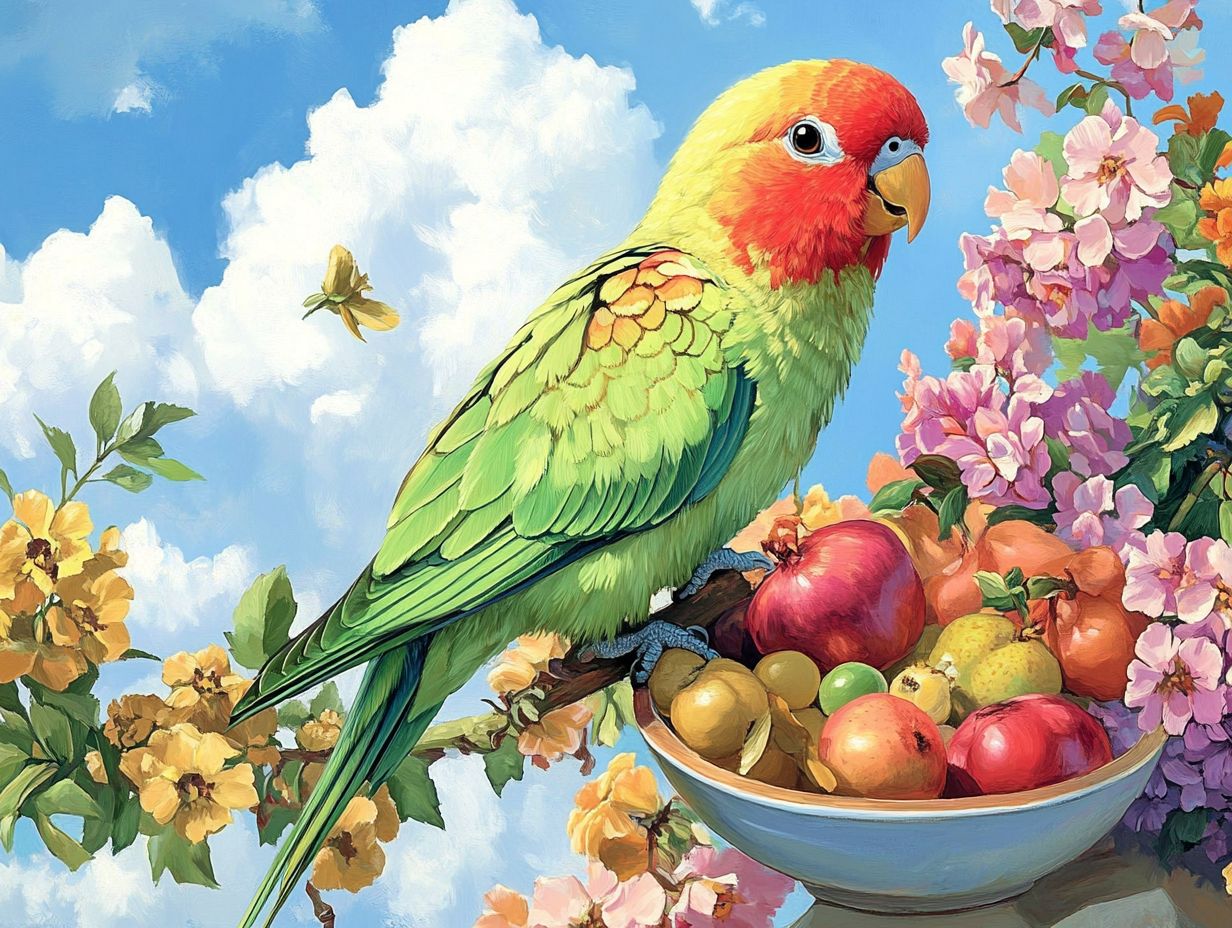
During winter, your pet birds face various challenges due to the cold and dryness. It’s essential to monitor their environment and care routines to ensure their health. Maintaining adequate humidity levels and providing warmth perhaps with heat lamps or cozy covers will help safeguard their respiratory system and overall well-being.
Place indoor humidifiers near their cages to effectively combat dry air, creating a comfortable atmosphere. Craft a warm nook by draping their cage in breathable fabric on particularly chilly nights to help retain body heat without the risk of overheating.
Regularly check for drafts around windows and doors; even slight air currents can disrupt your birds’ comfort and lead to stress or illness. Incorporate nutrient-rich foods with high water content into their diet to support hydration and enhance their winter health regimen.
Overall Tips for Maintaining Your Pet Bird’s Health
Maintaining your pet bird’s health requires a well-rounded care approach that integrates proper nutrition, regular exercise, and routine vet visits. Offer a balanced diet abundant in vitamins and minerals, such as vitamin D and calcium, to support their overall well-being.
Foster an active lifestyle through engaging toys and stimulating activities. This not only promotes healthy behavior but also keeps their energy levels soaring.
Nutrition, Exercise, and Regular Check-ups
Proper nutrition, regular exercise, and routine check-ups are vital for your pet birds’ health and wellness. A diet rich in essential nutrients, along with engaging activities that promote movement, helps your feathered companions stay active and healthy.
Understanding the specific dietary needs of different bird species is crucial since their health can be profoundly influenced by their diet. Incorporate a variety of seeds, fruits, vegetables, and pellets to support their immune systems and enhance their overall vitality.
Exercise is equally important. Create stimulating environments with toys and perches that encourage flight and climbing to combat obesity and boredom, which can lead to behavioral problems.
Schedule regular check-ups to facilitate vaccinations and monitor their weight. This helps spot any subtle changes in behavior that might signal underlying health concerns. By taking these proactive measures, you contribute to a happier, longer life for your beloved pet birds.
Frequently Asked Questions
What are some important seasonal health tips for my pet bird?
Some important seasonal health tips for your pet bird include:
- Monitoring their diet
- Ensuring they have access to clean water
- Providing shelter from extreme weather conditions
- Regularly checking for signs of illness
How should I adjust my pet bird’s diet during different seasons?
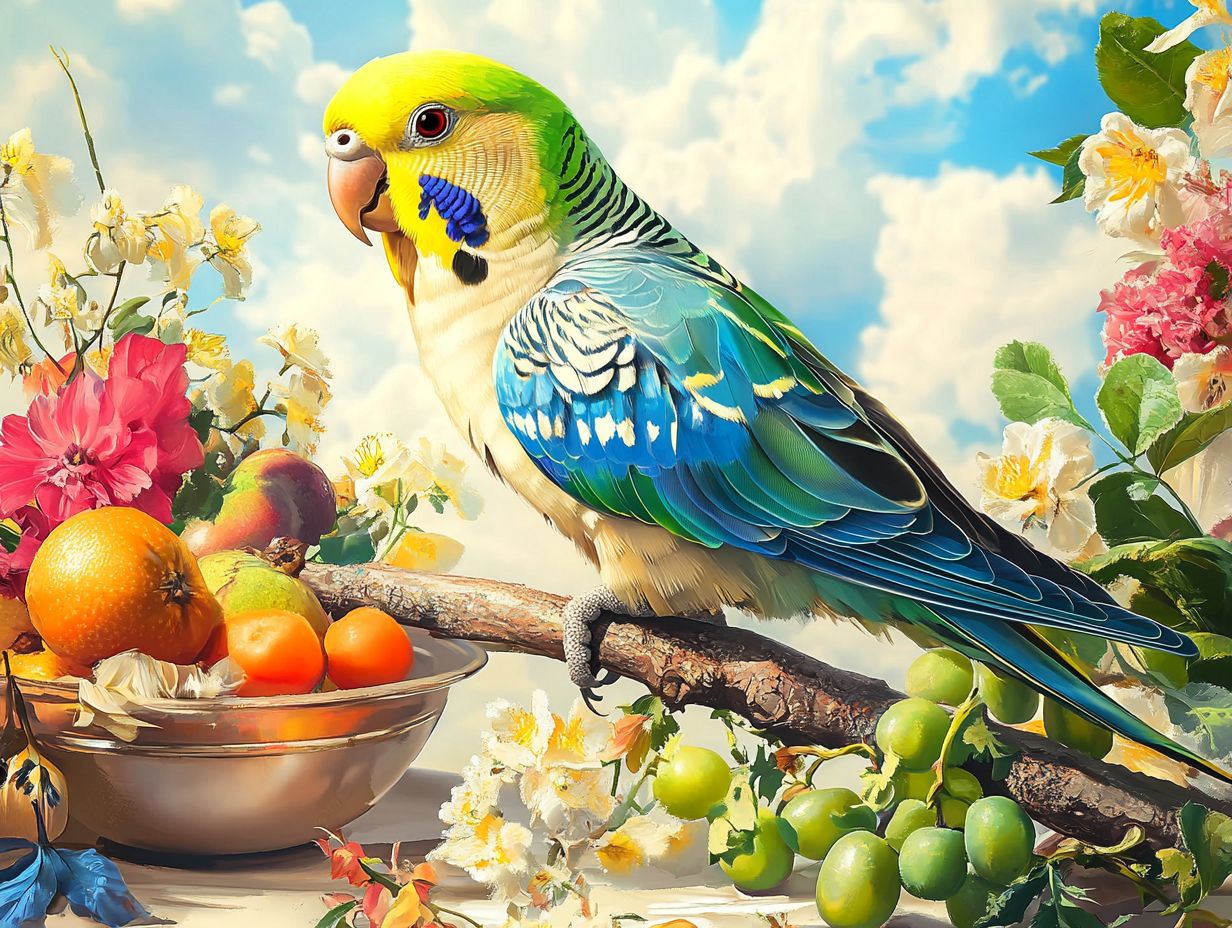
In warmer seasons, provide your pet bird with a variety of fresh fruits and vegetables to keep them hydrated. In colder seasons, increase their protein intake to help keep them warm. Consult with a veterinarian for specific dietary recommendations for your bird.
What kind of shelter should I provide for my pet bird during extreme weather conditions?
During hot weather, make sure your bird has access to shade and a cool, well-ventilated area. In cold weather, provide a warm and draft-free environment. If the temperature drops below freezing, consider moving your bird’s cage indoors.
How often should I clean my pet bird’s cage during different seasons?
Keep your bird’s home sparkling clean to ensure their happiness and health! Clean their cage regularly, regardless of the season. However, during warmer months when your bird may be spending more time outdoors, clean their cage more frequently to avoid bacteria growth and potential health issues.
Start implementing these winter tips today to keep your feathered friend happy and healthy!
Are there any common illnesses that pet birds are likely to get during certain seasons?
Pet birds can catch respiratory infections and heatstroke in warmer weather.
In colder months, they may not get enough vitamins and could catch colds.
Keep an eye on their health and consult a vet if something seems off!
How can I help my pet bird stay active during colder months?
To keep your bird active indoors, offer a variety of toys and activities!
Puzzle toys, different perches, and fun training sessions can keep them mentally and physically engaged.

